Module 3 Music Grammar1 & Grammar 2
文档属性
| 名称 | Module 3 Music Grammar1 & Grammar 2 |  | |
| 格式 | rar | ||
| 文件大小 | 423.9KB | ||
| 资源类型 | 教案 | ||
| 版本资源 | 外研版 | ||
| 科目 | 英语 | ||
| 更新时间 | 2010-05-13 20:12:00 | ||
图片预览

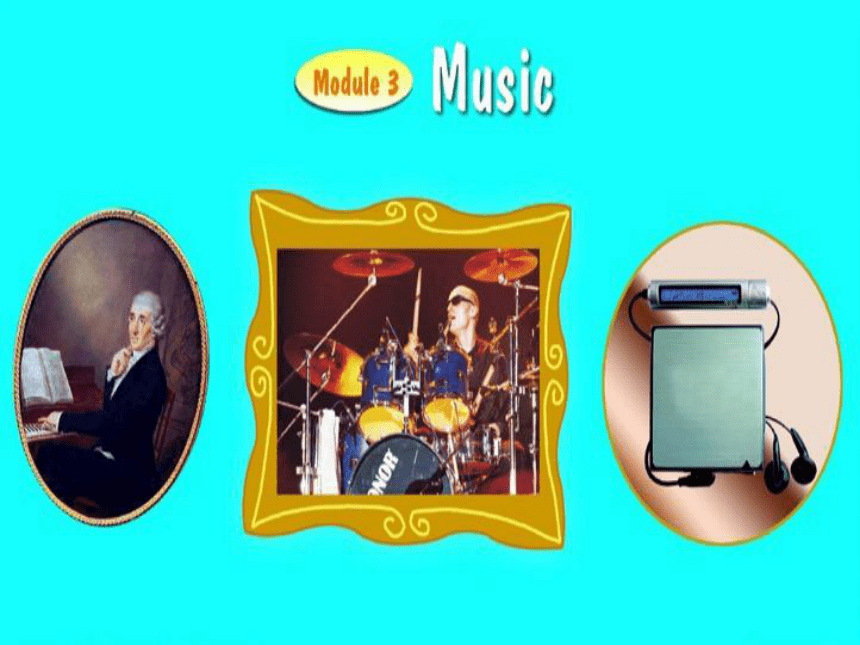
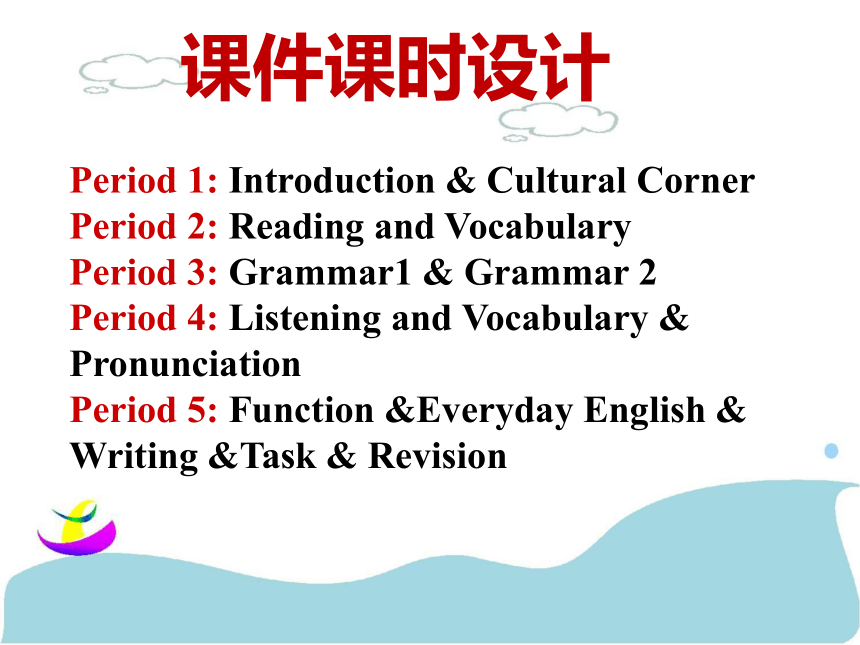
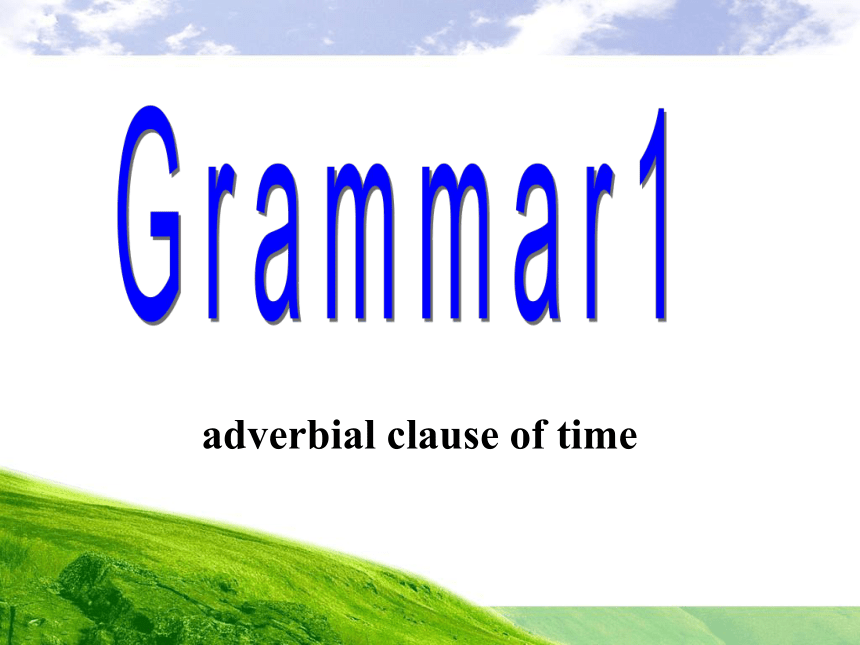

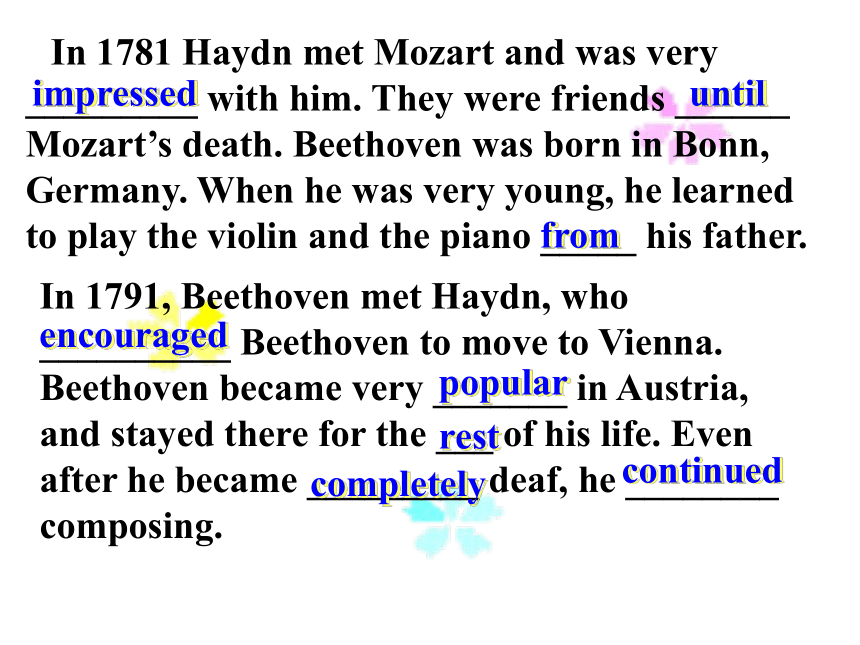
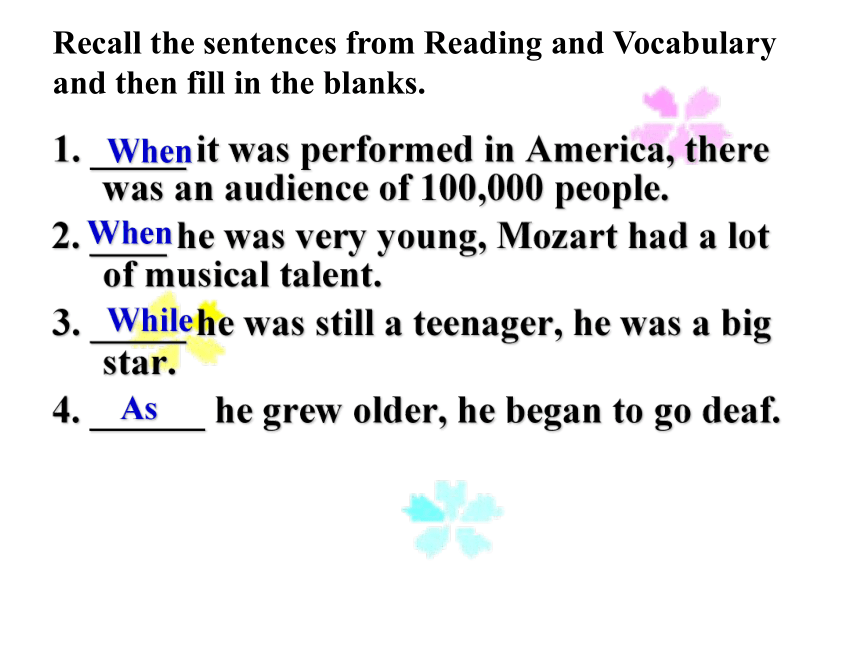
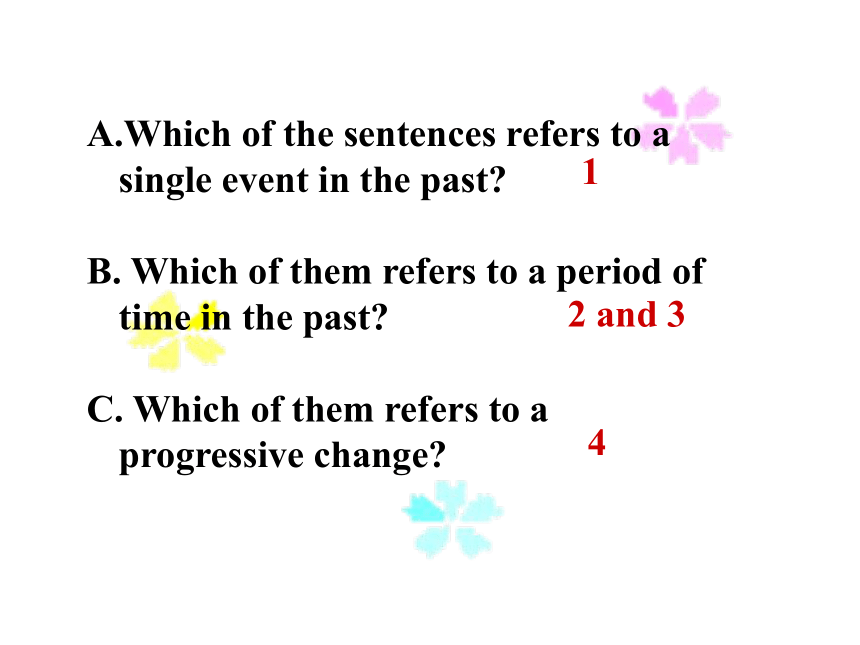
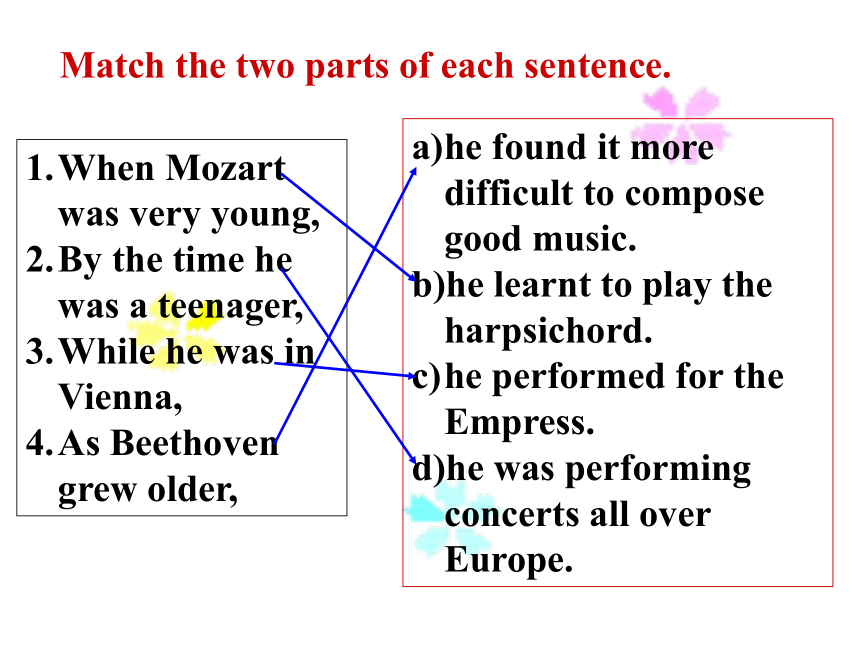
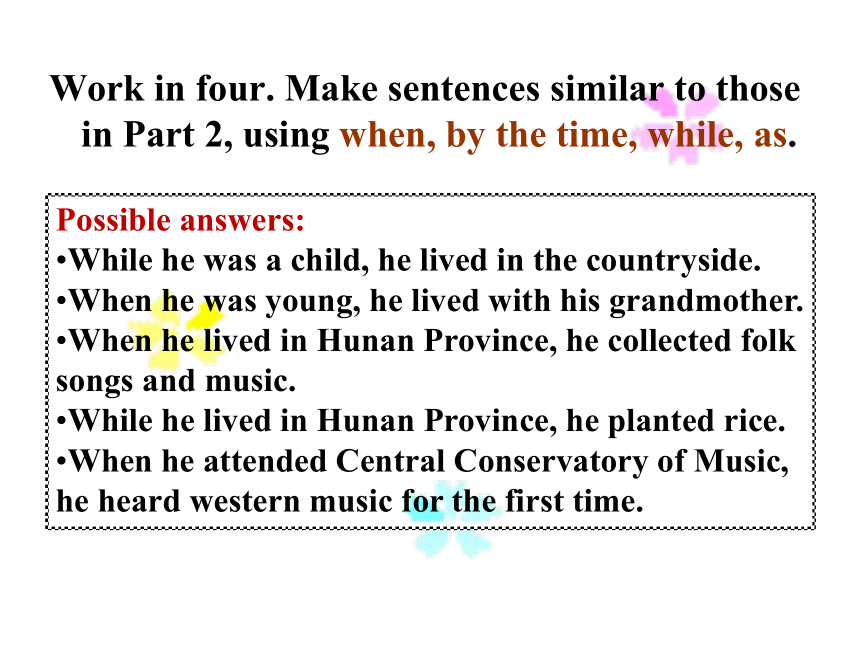
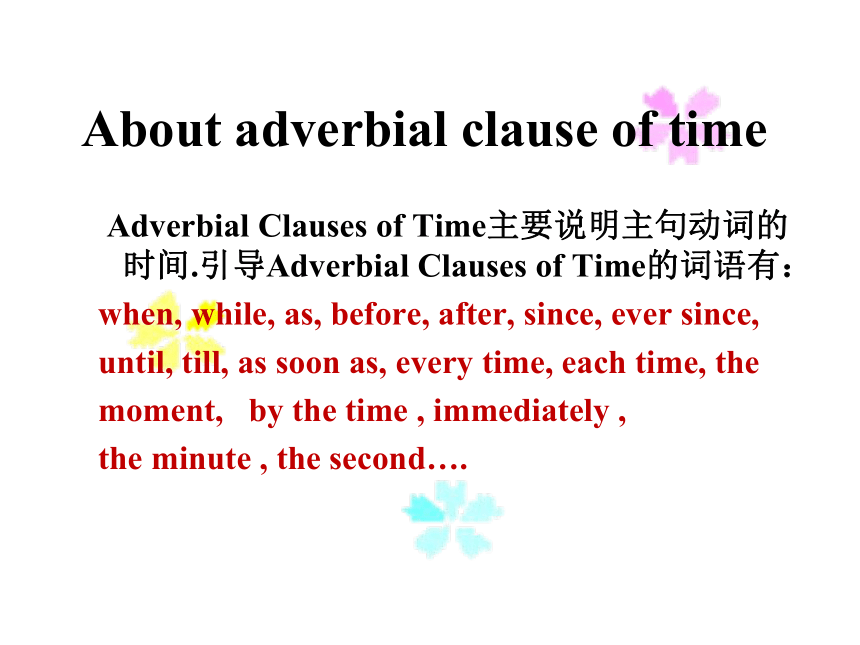
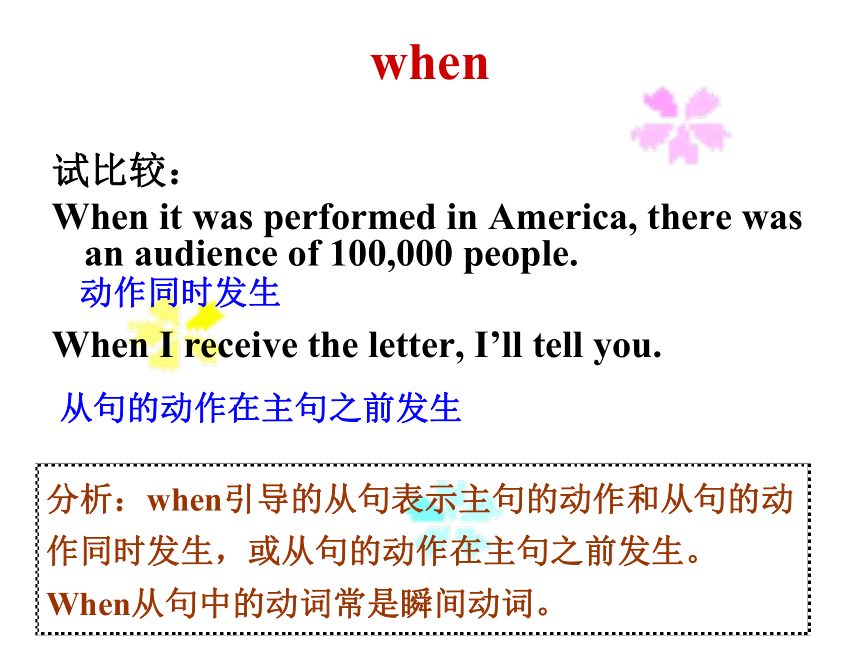
文档简介
课件32张PPT。课件课时设计Period 1: Introduction & Cultural Corner
Period 2: Reading and Vocabulary
Period 3: Grammar1 & Grammar 2
Period 4: Listening and Vocabulary & Pronunciation
Period 5: Function &Everyday English & Writing &Task & RevisionGrammar1 adverbial clause of timeAnother Austrian composer, Mozart, was born in Salzburg. _______ he only lived 35 years, he composed _________ 600 pieces of music, Mozart had musical _____ from a very early age. _________he was 14, he had composed many pieces for the harpsichord, piano and violin, ________ for orchestras. Thoughmore thantalentBy the timeas well asFill in the blanks with proper words or Phrases according to the text.Revision:In 1781 Haydn met Mozart and was very _________ with him. They were friends ______ Mozart’s death. Beethoven was born in Bonn, Germany. When he was very young, he learned to play the violin and the piano _____ his father.impresseduntilfromIn 1791, Beethoven met Haydn, who __________ Beethoven to move to Vienna. Beethoven became very _______ in Austria, and stayed there for the ___ of his life. Even after he became _________ deaf, he ________ composing.encouragedpopularrestcompletelycontinued1. _____ it was performed in America, there was an audience of 100,000 people.
2. ____ he was very young, Mozart had a lot of musical talent.
3. _____ he was still a teenager, he was a big star.
4. ______ he grew older, he began to go deaf.WhenWhenWhileAsRecall the sentences from Reading and Vocabulary and then fill in the blanks.Which of the sentences refers to a single event in the past?
B. Which of them refers to a period of time in the past?
C. Which of them refers to a progressive change?12 and 34Match the two parts of each sentence. When Mozart was very young,
By the time he was a teenager,
While he was in Vienna,
As Beethoven grew older, he found it more difficult to compose good music.
he learnt to play the harpsichord.
he performed for the Empress.
he was performing concerts all over Europe.Work in four. Make sentences similar to those in Part 2, using when, by the time, while, as.Possible answers:
While he was a child, he lived in the countryside.
When he was young, he lived with his grandmother.
When he lived in Hunan Province, he collected folk songs and music.
While he lived in Hunan Province, he planted rice.
When he attended Central Conservatory of Music, he heard western music for the first time.About adverbial clause of time Adverbial Clauses of Time主要说明主句动词的时间.引导Adverbial Clauses of Time的词语有:
when, while, as, before, after, since, ever since,
until, till, as soon as, every time, each time, the
moment, by the time , immediately ,
the minute , the second….when试比较:
When it was performed in America, there was an audience of 100,000 people.
When I receive the letter, I’ll tell you.分析:when引导的从句表示主句的动作和从句的动作同时发生,或从句的动作在主句之前发生。When从句中的动词常是瞬间动词。动作同时发生从句的动作在主句之前发生whileWhile they were doing homework, someone broke into the house.
While he was still a teenager, he was a big star.分析:while引导的从句表示“在……过程中”,强调某一段时间内主句和从句的动作在同一时期发生。从句的动作表示较长时间,因此常用延续性动词。as1)As they were picking tea, the girls were singing happily.
2) She sang as she worked.
强调两个动作同时进行两种情况一起发展变化分析:as引导的从句表示“当……时;一边……一边……”,主句和从句的动作同时发生,强调伴随。有时可译为“随着”。before1)It won’t be long before he finishes his writing.
2) I had cooked supper before my parents came back.分析:before引导的从句一般表示主句的动作发生在从句动作之前。after1) After he (had) finished his work, he left there.
2) After he came out, he locked the door.分析:after引导的从句一般表示主句的动作发生在从句动作之后。since / ever since1) It is (has been) two years since he came here.
2) He has been working here ever since he left university.分析:since / ever since引导的从句表示“自从……以来”,从句一般表示动作的起点,用过去时;主句表示动作延续的情况,一般用现在完成时或现在完成进行时。如果主句表示的是时间,主句可用一般现在时,也可用现在完成时。He will not go to bed until (till) his mother comes.
It is not until his mother comes home that he will go to bed.(强调结构)
till / until分析:till 和until引导的从句:表示“直到……”,主句和从句都为肯定式时,till和until都可用;表示“直到……才”主句用否定式,从句用肯定式,一般用until。As soon as she got home, she began to cook.
Every time/each time I catch a cold, I have pain in my back.
There was an applause the moment (as soon as) she appeared on the stage.
By the time he arrived, the train had already gone.其他Grammar2 The past perfect tenseAfter they ___________(become) stars in their own country, the Beatles toured the United States.
Before they visited India, they ______________ (record) had recorded seven albums.
had becomehad recordedRead these extracts and answer the questions. Which came first----becoming stars in their own country, or touring the United States?
Which came first----visiting India or recording seven albums?
What tense do we use to show that a past event happened before another one?Answers:
Becoming stars in their own country.
Recording seven albums.
The past perfect tense.Discuss the questions and answers.Answer to Part 2:
1. (a) means that their music had already changed by then. (b) means that it changed then.
2. (a) means that they had already sold more albums by then; (b)means that they sold more albums then.
B. Yes. In (a), the event happened before that time; in (b), the event happened at that time. Do it on your own. Then check the answer with your partner.
Answers to Part 3: joined, had played
toured, had become
recorded, had recorded
had recorded, split up
had split up, performedDo it on your own. Then check the answer with your partner.
Answers to Part 4:arrived, had left
arrived, had begun
happened, had left
made, had recordedMore about the past perfect tenseAfter they had become stars in their own country, the Beatles toured the United States.
We hadn’t seen each other since I left my hometown.分析:
过去完成时表示过去某一时间或动作之前已经发生的或完成的动作。它表示“过去的过去”。
表示在过去某一时间之前已经开始并一直持续到那时的动作或状态。分析:过去完成时常与by, for, before, since等介词短语或由after, before, since, when, by the time等引导的时间状语从句连用。Practice:
By the end of last year, we ____________________.
They __________________ when we arrived.Could you bring out time expressions or clauses often used in past perfect tense sentences?试比较:
By the late 1960s, their music had changed completely.
In the late 1960s, their music changed completely.
分析:
表示动作发生在“过去的过去”;
只表示动作发生在过去的某一点时间。1.他说他以前见过你。He said that he ______________ (see) you before.had seenBy six o’clock they ____________ (work) for eight hours. When I came to GZ , he _____________(be) there for a long time.2. 到了六点钟为止,他们已经工作了八小时了。3. 我到广州时,他在那里很长时间了。had workedhad beenComplete these sentences 5. 她到家之前她的孩子已经睡着了。When she got home, her children ____________(sleep).had slept6. 在他们到达之前电影已经开始了。Before they arrived, the film _________ already ___________ (start).had4.到上个月中旬我们在北京住了有五年时间了。By the middle of last month, we ______________(live) in Beijing for five years.had livedstartedComplete these sentences with the verbs in brackets.
Before Ringo ______ (join) the Beatles, he _________ (play) drums in another band.
Before they ______ (tour) America, the Beatles ___________ (become) stars in their own country.joinedhad playedtouredhad become3.Before they ______ (record) Let It Be, the Beatles __________ (record) eleven other albums.
4.After they ______ (record) Let It Be, the band ______ (split up).
5.After the group ______ (split up), all the Beatles __________ (perform) as solo artists.recordedhad recordedrecordedsplit upsplit upperformed6. Unfortunately, he ______ at the show after I ______. (arrive) (leave)
7. By the time we ______ at the stadium, the band _________ playing. (arrive) (begin)had leftarrivedarrivedhad begun8.Fortunately, the power cut __________ after the fans ______ the stadium. (happen) (leave)
9.Before he ________ his latest album, he __________ some songs with Paul McCartney. (make) (record)happenedleftrecordedhad made
Period 2: Reading and Vocabulary
Period 3: Grammar1 & Grammar 2
Period 4: Listening and Vocabulary & Pronunciation
Period 5: Function &Everyday English & Writing &Task & RevisionGrammar1 adverbial clause of timeAnother Austrian composer, Mozart, was born in Salzburg. _______ he only lived 35 years, he composed _________ 600 pieces of music, Mozart had musical _____ from a very early age. _________he was 14, he had composed many pieces for the harpsichord, piano and violin, ________ for orchestras. Thoughmore thantalentBy the timeas well asFill in the blanks with proper words or Phrases according to the text.Revision:In 1781 Haydn met Mozart and was very _________ with him. They were friends ______ Mozart’s death. Beethoven was born in Bonn, Germany. When he was very young, he learned to play the violin and the piano _____ his father.impresseduntilfromIn 1791, Beethoven met Haydn, who __________ Beethoven to move to Vienna. Beethoven became very _______ in Austria, and stayed there for the ___ of his life. Even after he became _________ deaf, he ________ composing.encouragedpopularrestcompletelycontinued1. _____ it was performed in America, there was an audience of 100,000 people.
2. ____ he was very young, Mozart had a lot of musical talent.
3. _____ he was still a teenager, he was a big star.
4. ______ he grew older, he began to go deaf.WhenWhenWhileAsRecall the sentences from Reading and Vocabulary and then fill in the blanks.Which of the sentences refers to a single event in the past?
B. Which of them refers to a period of time in the past?
C. Which of them refers to a progressive change?12 and 34Match the two parts of each sentence. When Mozart was very young,
By the time he was a teenager,
While he was in Vienna,
As Beethoven grew older, he found it more difficult to compose good music.
he learnt to play the harpsichord.
he performed for the Empress.
he was performing concerts all over Europe.Work in four. Make sentences similar to those in Part 2, using when, by the time, while, as.Possible answers:
While he was a child, he lived in the countryside.
When he was young, he lived with his grandmother.
When he lived in Hunan Province, he collected folk songs and music.
While he lived in Hunan Province, he planted rice.
When he attended Central Conservatory of Music, he heard western music for the first time.About adverbial clause of time Adverbial Clauses of Time主要说明主句动词的时间.引导Adverbial Clauses of Time的词语有:
when, while, as, before, after, since, ever since,
until, till, as soon as, every time, each time, the
moment, by the time , immediately ,
the minute , the second….when试比较:
When it was performed in America, there was an audience of 100,000 people.
When I receive the letter, I’ll tell you.分析:when引导的从句表示主句的动作和从句的动作同时发生,或从句的动作在主句之前发生。When从句中的动词常是瞬间动词。动作同时发生从句的动作在主句之前发生whileWhile they were doing homework, someone broke into the house.
While he was still a teenager, he was a big star.分析:while引导的从句表示“在……过程中”,强调某一段时间内主句和从句的动作在同一时期发生。从句的动作表示较长时间,因此常用延续性动词。as1)As they were picking tea, the girls were singing happily.
2) She sang as she worked.
强调两个动作同时进行两种情况一起发展变化分析:as引导的从句表示“当……时;一边……一边……”,主句和从句的动作同时发生,强调伴随。有时可译为“随着”。before1)It won’t be long before he finishes his writing.
2) I had cooked supper before my parents came back.分析:before引导的从句一般表示主句的动作发生在从句动作之前。after1) After he (had) finished his work, he left there.
2) After he came out, he locked the door.分析:after引导的从句一般表示主句的动作发生在从句动作之后。since / ever since1) It is (has been) two years since he came here.
2) He has been working here ever since he left university.分析:since / ever since引导的从句表示“自从……以来”,从句一般表示动作的起点,用过去时;主句表示动作延续的情况,一般用现在完成时或现在完成进行时。如果主句表示的是时间,主句可用一般现在时,也可用现在完成时。He will not go to bed until (till) his mother comes.
It is not until his mother comes home that he will go to bed.(强调结构)
till / until分析:till 和until引导的从句:表示“直到……”,主句和从句都为肯定式时,till和until都可用;表示“直到……才”主句用否定式,从句用肯定式,一般用until。As soon as she got home, she began to cook.
Every time/each time I catch a cold, I have pain in my back.
There was an applause the moment (as soon as) she appeared on the stage.
By the time he arrived, the train had already gone.其他Grammar2 The past perfect tenseAfter they ___________(become) stars in their own country, the Beatles toured the United States.
Before they visited India, they ______________ (record) had recorded seven albums.
had becomehad recordedRead these extracts and answer the questions. Which came first----becoming stars in their own country, or touring the United States?
Which came first----visiting India or recording seven albums?
What tense do we use to show that a past event happened before another one?Answers:
Becoming stars in their own country.
Recording seven albums.
The past perfect tense.Discuss the questions and answers.Answer to Part 2:
1. (a) means that their music had already changed by then. (b) means that it changed then.
2. (a) means that they had already sold more albums by then; (b)means that they sold more albums then.
B. Yes. In (a), the event happened before that time; in (b), the event happened at that time. Do it on your own. Then check the answer with your partner.
Answers to Part 3: joined, had played
toured, had become
recorded, had recorded
had recorded, split up
had split up, performedDo it on your own. Then check the answer with your partner.
Answers to Part 4:arrived, had left
arrived, had begun
happened, had left
made, had recordedMore about the past perfect tenseAfter they had become stars in their own country, the Beatles toured the United States.
We hadn’t seen each other since I left my hometown.分析:
过去完成时表示过去某一时间或动作之前已经发生的或完成的动作。它表示“过去的过去”。
表示在过去某一时间之前已经开始并一直持续到那时的动作或状态。分析:过去完成时常与by, for, before, since等介词短语或由after, before, since, when, by the time等引导的时间状语从句连用。Practice:
By the end of last year, we ____________________.
They __________________ when we arrived.Could you bring out time expressions or clauses often used in past perfect tense sentences?试比较:
By the late 1960s, their music had changed completely.
In the late 1960s, their music changed completely.
分析:
表示动作发生在“过去的过去”;
只表示动作发生在过去的某一点时间。1.他说他以前见过你。He said that he ______________ (see) you before.had seenBy six o’clock they ____________ (work) for eight hours. When I came to GZ , he _____________(be) there for a long time.2. 到了六点钟为止,他们已经工作了八小时了。3. 我到广州时,他在那里很长时间了。had workedhad beenComplete these sentences 5. 她到家之前她的孩子已经睡着了。When she got home, her children ____________(sleep).had slept6. 在他们到达之前电影已经开始了。Before they arrived, the film _________ already ___________ (start).had4.到上个月中旬我们在北京住了有五年时间了。By the middle of last month, we ______________(live) in Beijing for five years.had livedstartedComplete these sentences with the verbs in brackets.
Before Ringo ______ (join) the Beatles, he _________ (play) drums in another band.
Before they ______ (tour) America, the Beatles ___________ (become) stars in their own country.joinedhad playedtouredhad become3.Before they ______ (record) Let It Be, the Beatles __________ (record) eleven other albums.
4.After they ______ (record) Let It Be, the band ______ (split up).
5.After the group ______ (split up), all the Beatles __________ (perform) as solo artists.recordedhad recordedrecordedsplit upsplit upperformed6. Unfortunately, he ______ at the show after I ______. (arrive) (leave)
7. By the time we ______ at the stadium, the band _________ playing. (arrive) (begin)had leftarrivedarrivedhad begun8.Fortunately, the power cut __________ after the fans ______ the stadium. (happen) (leave)
9.Before he ________ his latest album, he __________ some songs with Paul McCartney. (make) (record)happenedleftrecordedhad made
